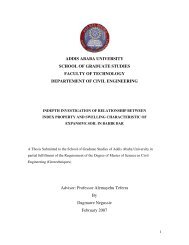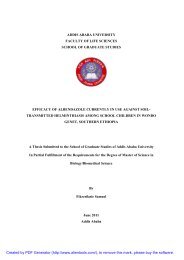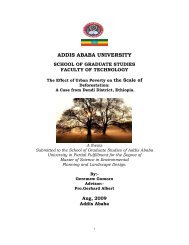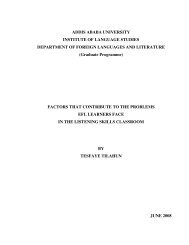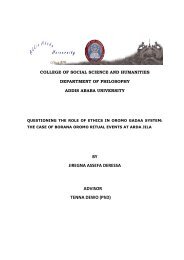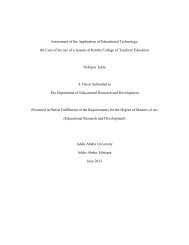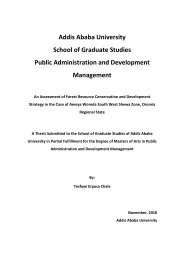AN ASSESSMENT OF WOREDA CAPACITY: THE CASE OF ...
AN ASSESSMENT OF WOREDA CAPACITY: THE CASE OF ...
AN ASSESSMENT OF WOREDA CAPACITY: THE CASE OF ...
Create successful ePaper yourself
Turn your PDF publications into a flip-book with our unique Google optimized e-Paper software.
Chapter One<br />
1 Introduction<br />
1.1 Background of the Study<br />
Decentralization and local governance are not a new concept though their emergence and<br />
exposure to academic discourses and discussions is a recent phenomenon. The two concepts are<br />
highly interrelated and interdependent concepts as local governance is defined to be the<br />
interaction between or among different local governance actors (private, public, and civil<br />
society organizations) as well as the coordination and integration among different sectors;<br />
whereas decentralization is a process that involves the transfer of planning, management,<br />
resource raising and allocation responsibility and functions from the central government and its<br />
agencies to one or more of the following local governance actors or institutions: field units of<br />
central government ministries or agencies, subordinate units or levels of government,<br />
semiautonomous public authorities or corporations, area-wide, regional or functional<br />
authorities, or nongovernmental private or voluntary organization.<br />
Accompanied by one or more of the following benefits of decentralized governance like<br />
improving the life of people at local level, enhancing human development, and deepening<br />
democracy, bringing the government closer to the people, promoting government<br />
responsiveness and accountability, increasing government‘s flexibility to address diverse needs<br />
of the population, reducing corruption through enhanced oversight, promoting the dispersal of<br />
power from monopolized political structures, and ensuring allocative efficiency (Rondinelli,<br />
et.al., 1983; Smoke, 2003; Rondinelli, 1999; Rondinelli, et.al, 1989; Litvack, et.al., 1998;<br />
Devas, 2006; Olowu, 2001; Conyers, 2006; Shah and Thompson, 2004; Hadingham, 2003;<br />
Lister and Betley, 1999; Cheema and Rondinelli, 2007; Crawford and Hartmann, 2008; Faguet,<br />
1997; Middleton et.al., 1987) though the result is one of mixed (Rondinelli, et.al., 1983), several<br />
countries have embraced one or more forms of decentralization as a means to promote<br />
participatory development and governance.<br />
Ethiopia has a limited experience of decentralization compared with several other African<br />
countries in which developed system of local government prevailed from colonial powers legacy.<br />
The effort to decentralize responsibility and power was begun in the country during the reign of<br />
1





